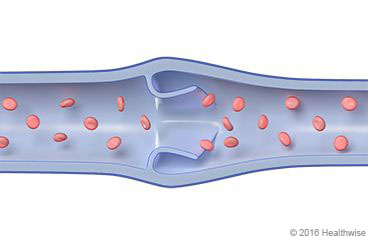Polycythemia: Care Instructions

Your Care Instructions
Polycythemia (say "paw-lee-sy-THEE-mee-uh) is an abnormal increase in red blood cells. Some people also have an increase in their white blood cells and platelets. The extra red blood cells make your blood thicker than normal. This may raise your risk for blood clots that can cause heart attacks or strokes. Clots can form in the deep veins of the body, a condition called deep vein thrombosis. Or a clot can travel through the blood to a lung (a pulmonary embolism).
Polycythemia is sometimes caused by other conditions, such as chronic lung disease or other problems that decrease the oxygen supply to the tissues in the body (hypoxia). This is called secondary polycythemia.
Treatment depends on the cause of polycythemia. Your doctor may treat you by taking out some of your blood (phlebotomy). The process is like donating blood. Your doctor may even recommend that you donate blood. Treatment may also include taking medicines or having therapy to increase oxygen to the body.
Follow-up care is a key part of your treatment and safety. Be sure to make and go to all appointments, and call your doctor or nurse advice line (811 in most provinces and territories) if you are having problems. It's also a good idea to know your test results and keep a list of the medicines you take.
How can you care for yourself at home?
- Be safe with medicines. If your doctor recommends aspirin or other medicines, take them exactly as prescribed. Call your doctor or nurse advice line if you think you are having a problem with your medicine.
- Follow your doctor's instructions if you have blood removed as part of your treatment. You will probably be advised to:
- Drink plenty of fluids before and after you have blood removed. If you have kidney, heart, or liver disease and have to limit fluids, talk with your doctor before you increase the amount of fluids you drink.
- Take it easy after you have had blood removed. Do not do vigorous exercise.
- If you smoke, try to quit or cut back as much as you can. If you need help quitting, talk to your doctor about stop-smoking programs and medicines. These can increase your chances of quitting for good.
- Ask your doctor if you can take an antihistamine to help calm the itching. Some people who have this condition have itching.
- Wear medical alert jewellery that lists your clotting problem.
When should you call for help?

Call 911 anytime you think you may need emergency care. For example, call if:
- You have sudden chest pain and shortness of breath, or you cough up blood.
- You have symptoms of a stroke. These may include:
- Sudden numbness, tingling, weakness, or loss of movement in your face, arm, or leg, especially on only one side of your body.
- Sudden vision changes.
- Sudden trouble speaking.
- Sudden confusion or trouble understanding simple statements.
- Sudden problems with walking or balance.
- A sudden, severe headache that is different from past headaches.
- You have symptoms of a heart attack. These may include:
- Chest pain or pressure, or a strange feeling in the chest.
- Sweating.
- Shortness of breath.
- Nausea or vomiting.
- Pain, pressure, or a strange feeling in the back, neck, jaw, or upper belly or in one or both shoulders or arms.
- Light-headedness or sudden weakness.
- A fast or irregular heartbeat.
After you call 911, the operator may tell you to chew 1 adult-strength or 2 to 4 low-dose aspirin. Wait for an ambulance. Do not try to drive yourself.
Call your doctor or nurse advice line now or seek immediate medical care if:
- You have signs of a blood clot, such as:
- Pain in your calf, back of knee, thigh, or groin.
- Redness and swelling in your leg or groin.
Watch closely for changes in your health, and be sure to contact your doctor or nurse advice line if you have any problems.
Current as of: October 7, 2024
